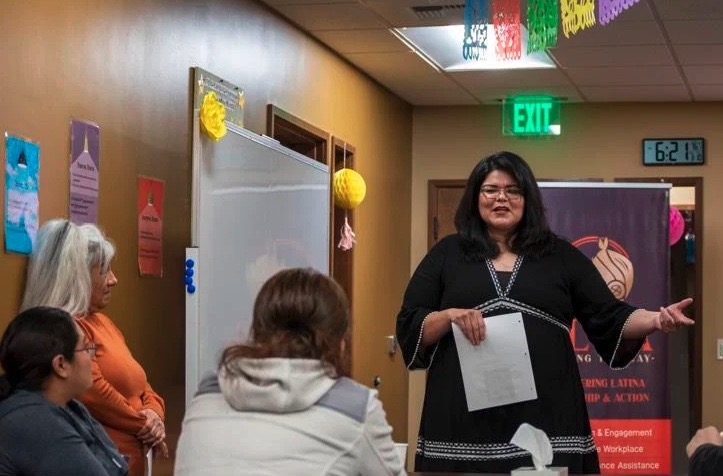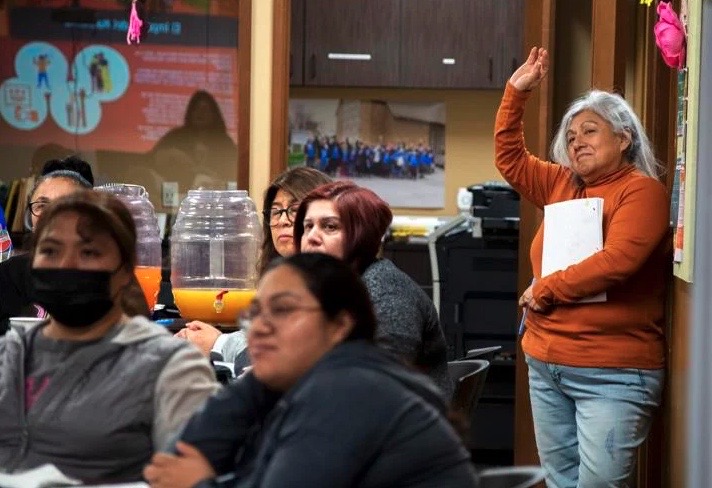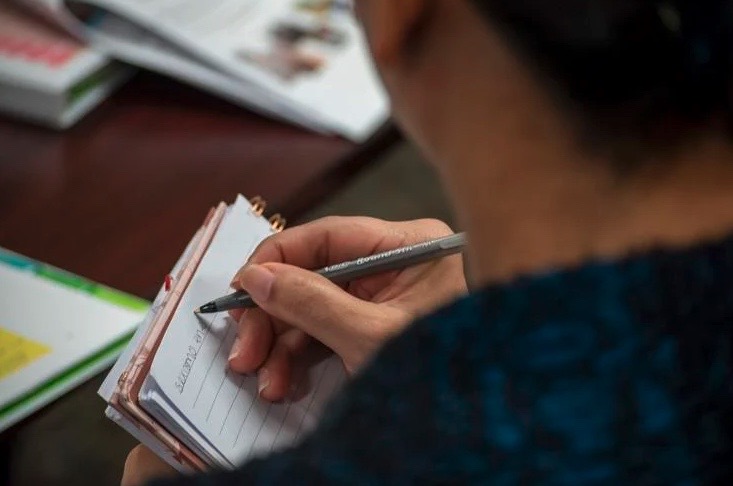
Yakima organization helps Latina women fight sexism and advocate for others
Published March 15, 2023
On a Friday evening in downtown Sunnyside, 20 or so women, most of them mothers and grandmothers and all Hispanic, sat inside a narrow classroom. Notepads, binders and writing utensils rested on their desks.
The women were discussing topics that are as taboo as they are a part of their daily life — sexism and machismo.

Their heads turned toward the back of the room to Teodora Martinez, who is part of ELLA, a group that organized the class.
“How many of you have been in an airplane,” she asked in Spanish, “when you’re sitting there about to take off and they start going through safety guidelines, whose mask do they tell you to put on first, especially when you have kids with you?
Maria Magaña, one of the women in attendance, responded: “In our church, they taught us to put the mask on our husbands first. … We were told they’re our second half. We can have more kids, but we are bonded to our husbands, we are taught to protect them.”
Meeting the need
ELLA was founded in 2021 by Maria Fernandez, a lifelong Yakima County resident who has been advocating for women’s empowerment for almost two decades. The organization hosts social events for Latina women to network and offers leadership training for women looking to move up the ranks at work, as well as civic education classes.
Fernandez, who was raised in Grandview, grew up seeing the way in which Latino culture placed women in subservient roles and prioritized the needs of men over women’s autonomy and independence.
Fernandez was exposed to this in every facet of her life, from childhood to her years in college, when she got her master’s in business administration, and later in the workforce. She decided to start an organization to give women the knowledge to break past the barriers put up by sexism.
ELLA, which is also the Spanish word for “her,” started less than two years ago, but the inspiration for the organization came from a similar organization Fernandez helped found in 2007 named Latinos Networking for Justice. She gave classes on civic engagement.
Fernandez taught women how to register to vote, broke down local politics and talked about the importance of civic engagement. Participants learned how to reach out to elected officials and understand where their tax dollars were going. The classes in Sunnyside, Granger and Yakima were always filled.
It wasn’t until years later, when she worked with Michigan State University on a study tracking victims of domestic violence in Yakima and other parts of the state, that she saw the need for Latina women to study and break down the way sexism affected their lives at a fundamental level.
“Unfortunately, I got to see a lot of abuses happen as women were trying to stay out of a situation of domestic violence,” Fernandez said “They’d leave home and come into the community looking for help that they needed to make sure they stayed away from home.”
Fernandez found many women had been deprived of the knowledge needed to be independent. Oftentimes, after failing to find work, help with childcare or any sort of support, women saw returning to their abuser as their only option.
“We encountered a lot of women who felt forced to go back for many different reasons that had nothing to do with wanting to be back with their ex,” Fernandez said. “There were financial reasons, basic housing needs, not getting the right help from different community services and facing many roadblocks and barriers.”
Understanding sexism
Back in the classroom, the conversation shifted to talking about sexism in the workplace.
One student, Maria, who asked to be identified only by her first name out of concerns of being recognized by coworkers and employer, spoke up about the fact that at her job, it was common practice for any successful idea she had to be co-opted by her male coworkers and superiors.
“It’s so common, and it’s happened so often in my career that I don’t care anymore,” Maria said. “I have to come up with these ideas to survive in the workplace, not to get extra credit. Then I leave a job and suddenly everyone is asking why there are so many problems now.”
Many of the women in the room nodded their heads in agreement. Some scoffed while others laughed understandingly. It was an experience many of them shared.

During the class, Fernandez pushed the women to face some uncomfortable truths about sexism and how it’s upheld. She said to overcome the effects of sexism, there has to be an acknowledgment of how women help perpetuate it.
She shared personal experiences. Though she said she loves her parents and in many ways they’re who she first learned about sexism and feminism from, they were still from a different time.
“Sometimes my dad would come home from work and he’d see my brother washing the dishes. He’d ask me, ‘What is Sergio doing washing the dishes?’” Fernandez said. “I’d tell him it was his turn to wash the dishes and my dad would tell me there were no turns, it was me and sister’s responsibility to wash the dishes every time.”
“Despite this, do you know in my and in many households, who really upheld these ideals of sexism and machismo?”
“Moms,” said many of the women.
Breaking the stigma
For the rest of the class, the women talked about their experiences with sexism. Others touched on how they were raising their own children to recognize sexism and fight it.
Fernandez said that for some women in the class, this was their first time facing the topic of sexism head on, despite having lived with it and recognizing it for most of their lives.
She added that the two-hour class dedicated to sexism was an extension of the previous class. The women in the class wanted to expand the topic of sexism into a four-hour-long conversation.
“At first, I wasn’t sure how comfortable the women would be talking about this,” Fernandez said. “It’s a taboo subject in our culture. Before the first class, some women approached me, saying they weren’t telling their families what the class was about or that they were going at all.”
It was the third of six classes this winter. The next class will be at Nuestra Casa in Sunnyside on Friday, March 17. While there are three classes left, women can still register by visiting WeAreElla.org
Topics left to cover include self-care, exploring leadership positions in the workplace and learning to make one’s voice heard in professional settings.
– por Santiago Ochoa, periodista del Yakima Herald Republic
Santiago Ochoa is a bilingual journalist covering health care access at the Yakima Herald-Republic in Yakima, Washington. Before joining the Herald, Ochoa reported for Flint Beat in Flint, Michigan, covering the city’s Latino population—health care, education, community building and more, and winning top honors in the Michigan Press Association’s feature category. He served as photographer and later editor for his college newspaper, The Michigan Times. When he’s not working, Ochoa enjoys cross-country trips on his motorcycle, going to the movies, reading and skiing.



1 Comment Found
Deepest Gape MoonChristine Says:
May 14, 2023My spouse aand I stumbled over herre coming from a different website andd tthought I might chek things out. Ilike whaqt I ssee so now i am followinng you. Loook forward tto finding out aboht youir web page yyet again.